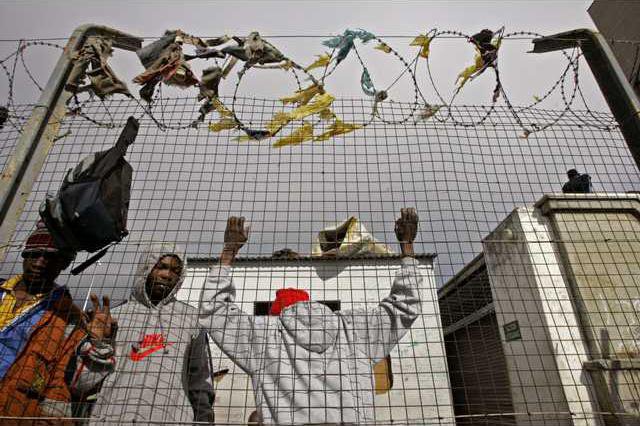JOHANNESBURG, South Africa — Foreigners fleeing their homes in the face of anti-immigrant violence must be housed in better facilities — but the shelters must not become permanent, government officials said Wednesday.
The government has been promising to move those seeking refuge in police stations, town halls and churches to better shelters. An announcement on government plans to accommodate the displaced is expected Thursday.
At least 56 people have been killed and nearly 50,000 foreigners forced from their homes in a wave of attacks by South Africans who accuse them of taking jobs and being responsible for crime.
Hlangwani Mulaudzi, a government spokesman, said officials were still identifying land and finalizing logistical details.
However, he said the government does not want the shelters to be ‘‘labeled as refugee camps’’ and hopes all those displaced eventually will be integrated back into their communities.
‘‘We have a problem now, so let’s put up shelters. But we don’t want to see them become permanent,’’ he said.
The government must ensure the shelters have proper health and sanitation services, he said. Mulaudzi also said the government wants the shelters to be close to the victims’ homes so they could return to work or school.
‘‘We don’t want to put them far away but find better areas nearby,’’ he said.
In Cape Town, nearly 20,000 people have been accommodated into makeshift shelters of huge tents but city authorities have been criticized for promoting ‘‘internment camps’’ in remote locations.
A coalition of health and human rights groups said that ‘‘exile’’ to these camps will make reintegration more difficult and put further stress on the delivery of health and sanitation services in the city.
There are also concerns that setting up shelters would make foreigners more identifiable and add to tensions with poor South Africans who feel immigrants are given special treatment.
Nde Ndifonka, spokesman for the International Organization for Migration, said the government’s move to find better accommodation for those displaced should be welcomed as a temporary measure.
‘‘A lot of people have been displaced and conditions where they are staying are deplorable now, so as a temporary measure this is necessary,’’ he said.
However, Ndifonka stressed that the shelters should not become permanent.
‘‘I don’t think for people to be living there in the long-term benefits either the community or the foreigners,’’ he said. ‘‘There are limited resources, so the sooner people are back in their communities, the better.’’
Meanwhile, Nigeria is demanding reparation for attacks on its citizens. Nigerian Foreign Minister Ojo Madueke said late Tuesday that officials had compiled a list of Nigerians injured or looted during the attacks on foreigners. He said Nigeria would ask the South African government to offer Nigerian victims monetary recompense.
South Africa’s department of foreign affairs said no formal request had been made by Nigerian authorities.
Nigerian President Umaru Yar’Adua is expected to travel to South Africa in the coming days.
———
Associated Press writer Bashir Adigun in Abuja, Nigeria, contributed to this report.
The government has been promising to move those seeking refuge in police stations, town halls and churches to better shelters. An announcement on government plans to accommodate the displaced is expected Thursday.
At least 56 people have been killed and nearly 50,000 foreigners forced from their homes in a wave of attacks by South Africans who accuse them of taking jobs and being responsible for crime.
Hlangwani Mulaudzi, a government spokesman, said officials were still identifying land and finalizing logistical details.
However, he said the government does not want the shelters to be ‘‘labeled as refugee camps’’ and hopes all those displaced eventually will be integrated back into their communities.
‘‘We have a problem now, so let’s put up shelters. But we don’t want to see them become permanent,’’ he said.
The government must ensure the shelters have proper health and sanitation services, he said. Mulaudzi also said the government wants the shelters to be close to the victims’ homes so they could return to work or school.
‘‘We don’t want to put them far away but find better areas nearby,’’ he said.
In Cape Town, nearly 20,000 people have been accommodated into makeshift shelters of huge tents but city authorities have been criticized for promoting ‘‘internment camps’’ in remote locations.
A coalition of health and human rights groups said that ‘‘exile’’ to these camps will make reintegration more difficult and put further stress on the delivery of health and sanitation services in the city.
There are also concerns that setting up shelters would make foreigners more identifiable and add to tensions with poor South Africans who feel immigrants are given special treatment.
Nde Ndifonka, spokesman for the International Organization for Migration, said the government’s move to find better accommodation for those displaced should be welcomed as a temporary measure.
‘‘A lot of people have been displaced and conditions where they are staying are deplorable now, so as a temporary measure this is necessary,’’ he said.
However, Ndifonka stressed that the shelters should not become permanent.
‘‘I don’t think for people to be living there in the long-term benefits either the community or the foreigners,’’ he said. ‘‘There are limited resources, so the sooner people are back in their communities, the better.’’
Meanwhile, Nigeria is demanding reparation for attacks on its citizens. Nigerian Foreign Minister Ojo Madueke said late Tuesday that officials had compiled a list of Nigerians injured or looted during the attacks on foreigners. He said Nigeria would ask the South African government to offer Nigerian victims monetary recompense.
South Africa’s department of foreign affairs said no formal request had been made by Nigerian authorities.
Nigerian President Umaru Yar’Adua is expected to travel to South Africa in the coming days.
———
Associated Press writer Bashir Adigun in Abuja, Nigeria, contributed to this report.

